Projects
together & sustainable
Mongolia
The task was to plan, develop, implement and evaluate a competency assessment test for vocational teachers. The main objective was to evaluate whether the teachers have the necessary professional skills to effectively teach the current curriculum.
In addition to providing a basis for training plans, the competence assessment was intended to transfer the experience of the practical test into daily teaching. The practical test consisted of disassembling and assembling the cylinder head according to the manufacturer’s specifications, as well as de-energising a hybrid vehicle according to the manufacturer’s specifications. For this purpose, 5 Hyundai engines were used on assembly stands that had been largely untouched for at least 10 years.
The speed and sustainability of the process surprised us greatly. Immediately after the test, the teachers had one group of students work on one engine and a week later they expanded to five groups, so real hands-on training. The basic skills to facilitate and accompany hands-on training were there. By using the manufacturer’s documentation and the practical experience, the hurdle that had prevented Hands-on Training until then could be overcome.
Furthermore, practical material was to be developed in order to enable a practice-oriented teaching of basic functions of vehicle systems. In 2019, about 50 % of the vehicles in Mongolia were Toyota Prius Hybrid vehicles with high-voltage systems. A used Toyota Prius was purchased for training at the school. I developed break-out boxes and an ABS simulator for the Prius 2. The break-out boxes can be connected with original connectors between the control units and the wiring harness. Now fault measurements described in the manufacturer’s manuals can be easily carried out, the individual contacts are easy to identify and reach.
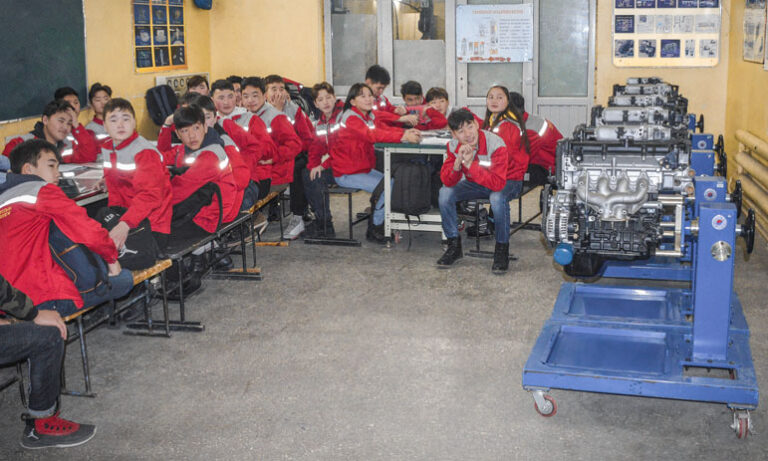
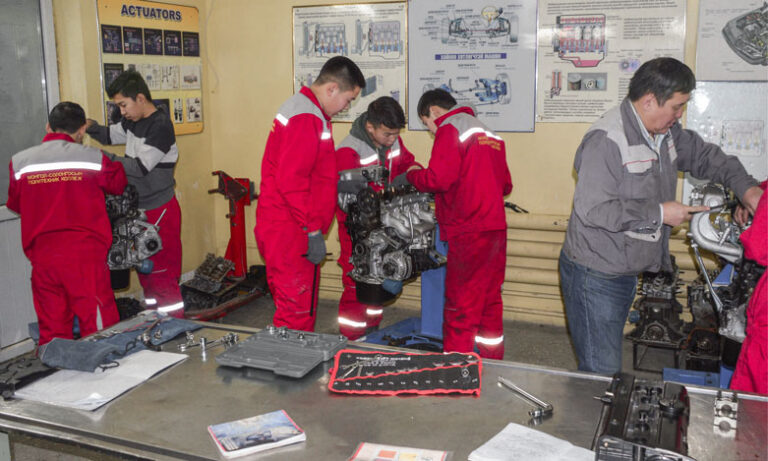
Frontal teaching before competence assessment – r. the pristine engines
Situation after the determination – working in small groups one week later
Laos
In Laos, my work started with the development of a curriculum for the existing DCT curriculum. This was accompanied by the development of a report card and a final examination. The main challenges were:
Electronic Vehicle Systems had not been taught up to that point –
Practical lessons in international understanding hardly took place –
Contemporary written teaching material was not available –
The dual training system was introduced by the government, the industrial partners still are not fully taking responsibility for their area of training.
The practical equipment of the school workshops was outdated and manageable. Few people in Laos in 2019 had sufficient English language skills to work with English language materials.The basic idea of working with manufacturers‘ manuals proved to be viable.
The concept of translating textbooks is not very sustainable, even within the project it proved expensive and difficult to translate larger sections of repair manuals into Lao. At the beginning of the project, translation programmes for this language were not sophisticated enough, but in 2022 we noticed that the translation quality has improved enormously. The teachers can now independently translate up-to-date manuals with online translation programmes. The quality is sufficient for technical understanding.
During my last mission Dec. 2022, all schools had a small car available as teaching material. Together with the manuals, the teachers were able to experience that with the vehicles in combination with the repair and diagnostic manuals, everything was available for up-to-date training.
As part of this project, I developed training materials with a focus on electronic and electrical systems. They are based on vehicle control units commonly used in this region (small cars & motorbikes) and can be used with the manufacturer’s manuals. An optimal supplement to this are the complete vehicles, which would cover the entire spectrum, from didactically prepared subsystems to the complete vehicle in hands-on training.
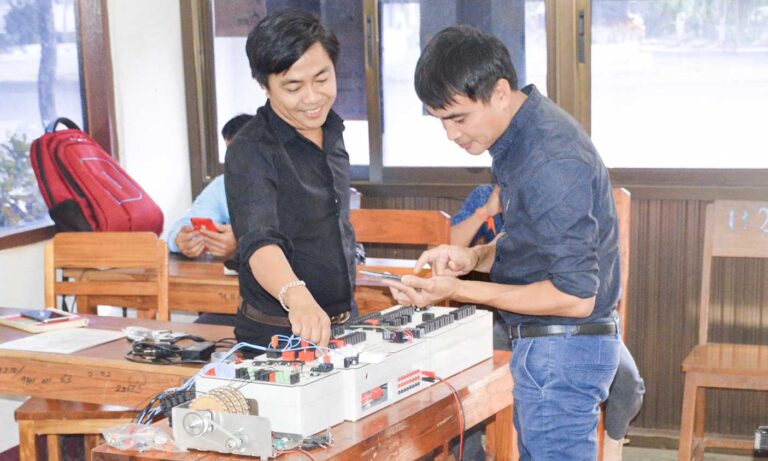
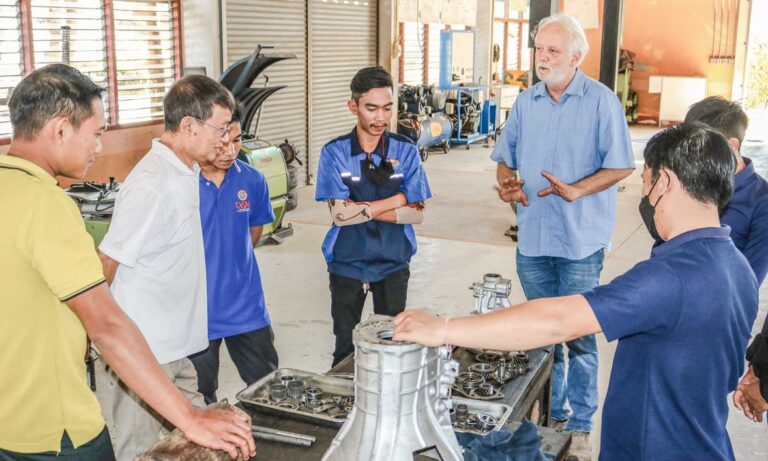
Gaining experience with the ECU simulators
Didactic preparation of a learning situation
Kenya
For the technical training project for the Eastlands College of Technology in Nairobi, I worked in a team with Heike Häußling (Master’s degree in vocational education and sociology).
In cooperation, we jointly developed sustainable and competence-based training and education sessions. The outcome was multiplied by the vocational education supplement. In addition to a greater technical depth of learning, a direct transformation to contemporary pedagogical learning concepts could also take place.
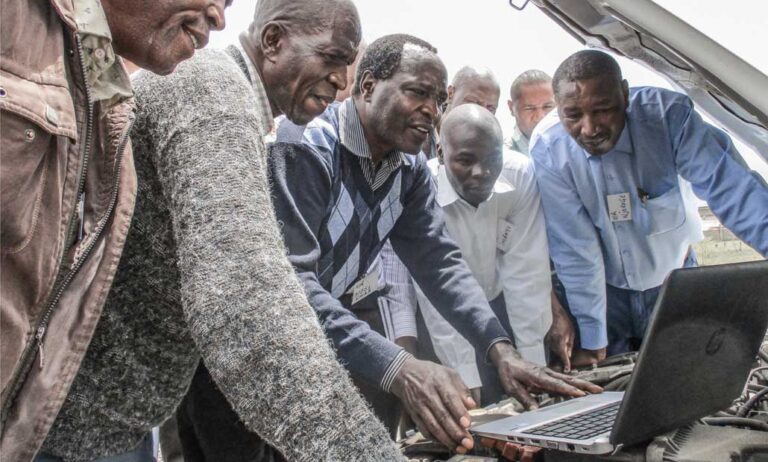
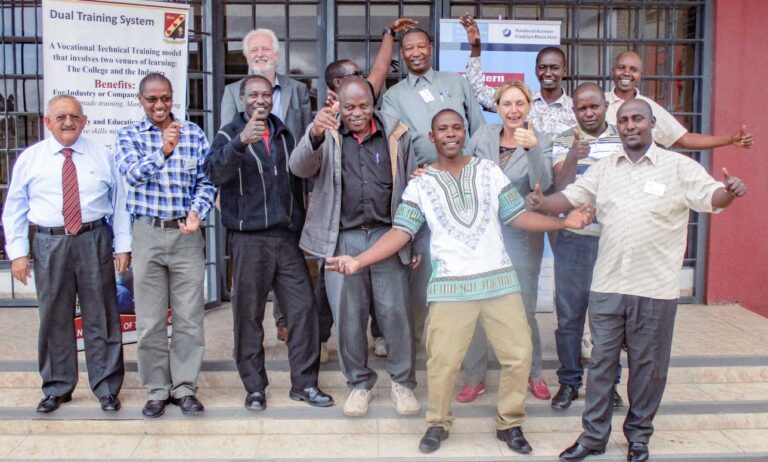
ECU diagnostics on the vehicle
mood picture from the training